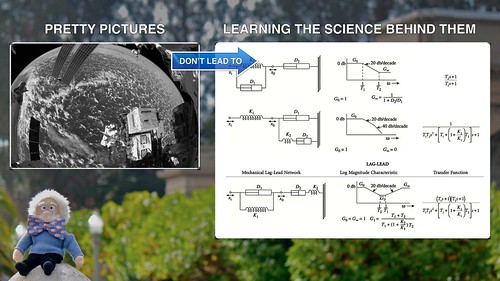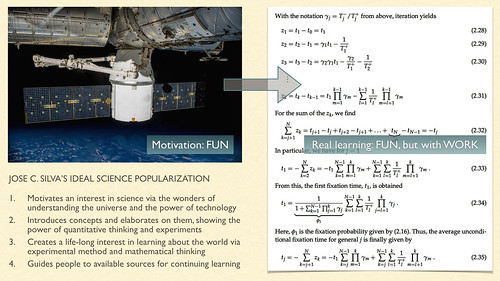Science identity products
Science identity products like t-shirts, mugs, posters, and computer wallpapers are used to signal that the owner has an interest in science; unfortunately, because this interest in science has become fashionable -- at least in some segments of the population -- poseurs also buy these objects, lowering the quality of the signal.
I've written often (one, two, three, four, five times at least) about the problems with using science as an identity product, as with the people who "love science" as long as they don't have to learn any.
These products aren't necessarily only appealing to poseurs, though. People with a real interest in science and in science education also like them for, among other reasons,
1. Identity signaling. Like the poseurs, except it this case it's a real signal. People want to communicate their interest in science and the beauty of some scientific results and natural phenomena. (I own quite a few science identity products myself.)
2. Recruitment. These products can be useful motivators for bringing newcomers into an appreciation of science. By showing that there are other
3. Mere exposure. People like or at least feel more comfortable with things that appear familiar. The more exposure people have to scientific concepts and images, even if as part of jokes or background material in sitcoms like The Big Bang Theory, the less aversion they may feel when science content is presented to them.
There's one possible disconnect undermining these three points, though: that people who are influenced by exposure to the science identity products only like the aesthetics:
The big problem with the poseurs, which is a real problem not just my "I liked that band before it was cool" complaint, is not that they use the products to pretend to like science, though that would be bad enough. The real problem is that poseurs know that they don't actually like (or know) real science, so they feel threatened by those who do and take action to counter that threat, usually distracting from the science.
As my previous post showed, many poseurs in the media try to be "sciencey" but they fail miserably because in the end they don't understand that science is not like literature or art where the judgment of some other people is what matters. In science, reality is what matters. Poseurs don't get that, because to them reality is whether others buy into their pose.
Popular science content
Making science accessible to the general public is one of the most effective ways to improve society: it allows more people to partake of the benefits of knowledge (for example, avoiding junk science and quackery), it helps garner support for scientific enterprises that require public funding, and it creates the foundations for new generations with more and better scientists.
The problem is that popularizers can be real science popularizers or they too can be poseurs. And the poseur popularizers tend to be more popular. The glaring exception is Carl Sagan, but that's because he was both a pioneer in popularization and a real research scientist prior to that.
The most obvious difference is that Carl Sagan's Cosmos was designed to impress people with the power of science, while many current popularizers design their programs to impress upon the audience (a) how special they, the audience, are; and (b) how smart, knowledgeable, and suave the popularizer is. There are some exceptions, but they aren't the most successful popularizers, at least not on TV.
A rule-of-thumb that works for me is to ask whether the popularizer is an active researcher (or was until recently active) in the field. People whose job is some variation of "science popularizer" tout-court, even if they have some scientific training (which many of them don't), tend to focus on people and events rather than concepts and principles. In other words, they popularize the story of science rather than the actual science. (In many cases they either avoid the science completely, or they get most of it wrong.)
This rule works for two reasons:
First, an active researcher will know the science better than a non-researcher popularizer. This IMNSHO more than balances any communication advantages the non-researcher might have. One of the hilarious examples of this advantage is The Igon Value Problem, where active researcher Steven Pinker takes on the intellectual lightweight Malcolm Gladwell. (But supporting my observation above, Gladwell is more popular than Pinker.)
Second, an active researcher has to protect his/her reputation in the field. This adds motivation to get things right to the knowledge (the ability to do things right). When no one in Astrophysics takes you seriously (because you call yourself a scientist but your career total citations of 150 mark you as a museum manager), you can say ignorant things on twitter about planes and helicopters. An engineer who wrote nonsense like this would be mocked at any future technical conferences he/she attended:
Personally I decided to read textbooks in lieu of popularization books,* but there are some popular books I've read that I found worthy of recommendation, so here are two for now:
Deep science (or other technical) content
Leaning technical material is something that requires audience (perhaps in this case "student" would be the better term) participation.
Lectures can motivate study and are a good introduction to the material, but only self-paced study and practice exercises can make technical material stick.
There's a qualitative difference between (to quote again from my old post about Heisenberg) understanding that this is a joke, i.e. popularizer-level understanding:
Police officer: "Sir, do you realize you were going 67.58 MPH?and being able to completely spoil the joke by computing the actual uncertainty (deep understanding):
Werner Heisenberg: "Oh great. Now I'm lost."
A simplified form of Heisenberg's inequality, good enough for our purposes, is
$\qquad \Delta p \, \Delta x \ge h $
Going by orders of magnitude alone, assuming that the mass of Heisenberg plus car is in the order of 1000 kg, and noting that the speed is given to a precision of 0.01 mi/h, an order of magnitude of 10 m/s, with $h \approx 10^{-34}$ Js, we get a $\Delta x$ of the order of
$\qquad \Delta x \approx \frac{ 10^{-34} }{10 000} = 10^{-38}$ m.Only practice and study can create the kind of deep understanding that allows you to spoil people's fun at parties with numerical sidebars like this. Certainly something to aspire to...
That's not to say that lectures don't have value; I think of them as the warm-up sets you do before actually exercising. In that sense, they are very important, since they provide a passive experience that gets the material into context, setting up the active experiences of self-paced study and practice exercises.
Walter Lewin, shamefully retconned out of OCW and their official YouTube channels by MIT for undisclosed non-scientific transgressions, was one of the best Physics instructors online; even better than Feynman, since Lewin used actual in-class demonstrations and calculations matched to the examples. Here's a great class on standing waves:
As for most MOOCs, I already wrote my views in my post "MOOC-rize this," and the TL;DR is:
1. MOOCs have economies of scale in production and diffusion, but the difficult parts of education, personalized attention, for example, don't scale.
2. MOOCs can derive brand equity from the institutions associated with the teaching, but whether that brand equity is deserved is an open question: there are many components to education beyond what most MOOCs offer. I made some observations about that regarding the Kenan-Flagler Online MBA.
3. MOOCs built out of classroom teaching and associated materials are audience-targeted; a course like Lewin's works well at MIT and possibly CalTech, but the speed of exposition and the amount of off-classroom work that Lewin expected from his students will not work for most other universities. Other materials, like textbooks, may partially make up for this, but even so most students would probably prefer better match between materials and audiences.
4. The major weakness of MOOCs as they exist now is the lack of evaluation and, in many cases, of ways to check your exercises. Since audiences (students) learn from these exercises, done individually and then corrected by a knowledgeable instructor, this is actually a much bigger weakness than I noted on the "MOOC-rize this" post.
In conclusion
There's nothing wrong about being out and proud as
In the end what matters is that you want to learn. Poseurs don't want to.
-- -- -- -- -- -- FOOTNOTE -- -- -- -- -- --
* I find textbooks to do a better job than popularization books since I want to learn things at a more proficient level than a passing understanding. This requires time and effort, but I like it. (Hey, I lift heavy weights for no reason other than I like lifting heavy weights, so this isn't that different.)
The one enormous barrier to this approach is the ridiculous cost of textbooks in the US. I was interested in molecular biology, so I got Molecular Biology of the Gene, I believe for its weight in gold. There's now a new edition which costs its weight in diamonds, so I won't get that. Note that this is a personal interest in molecular biology; this is not work-related or anything monetizable, so the $\$200$ are a hobby expenditure. Which is fine, but still could discourage others from buying such an expensive book for a hobby.
I rationalize the cost by reminding myself of an old business associate who spent $\$150$ on a date with someone who, according to his later report, made Lady Macbeth sound warm and cuddly. So, that's about 3/4 of a textbook he could have bought there...




